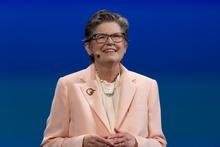- August 17, 2023
Mark Rudich describes himself as a nontraditional student, but maybe that’s because he’s more used to teaching classes than taking them. After several years teaching exercise science to college students in Texas, he’s now part of the first cohort of students in the College of Public Health’s Master in Nutrition Program dietetics concentration, now beginning its second year.
- July 19, 2023
Davis will serve a one-year term as leader of the organization that advocates for the role of acute and critical care nurses in the health care system.
- June 5, 2023
Samantha Harrison, who graduated this spring with a bachelor’s degree in community health with a global health concentration, says that discovering the community health degree provided her with a comprehensive way to achieve her ambitions to bring equity to communities through well-being.
- May 15, 2023
Samantha Kanselaar and Julia Mandeville are among the first group of recipients of grants for a new initiative sponsored by George Mason University’s Office of the Provost. The program offers mentoring support and funding for graduate students’ project ideas that advance the university’s values of access and inclusion.
- May 1, 2023
Theresa Smith received $5,000 to the advancement of the nursing profession via research.
- May 8, 2023
Substance use disorder affects more than 40 million Americans according to the 2020 National Survey on Drug Use and Health. Recovery can be a difficult path, but an interdisciplinary team led by Holly Matto, associate professor in the Department of Social Work, aims to make it a little easier through a recently patented technology-based therapy.
- November 22, 2021
In a recent study, George Mason University Associate Professor Hong Xue, PhD and colleagues evaluated the impact of ending market exclusivity for brand-name statin drugs. The first study to comprehensively assess the economic impact of generic competition for statins found that ending market exclusivity for statins saves U.S. $12 billion and individuals nearly $1,000 annually.







